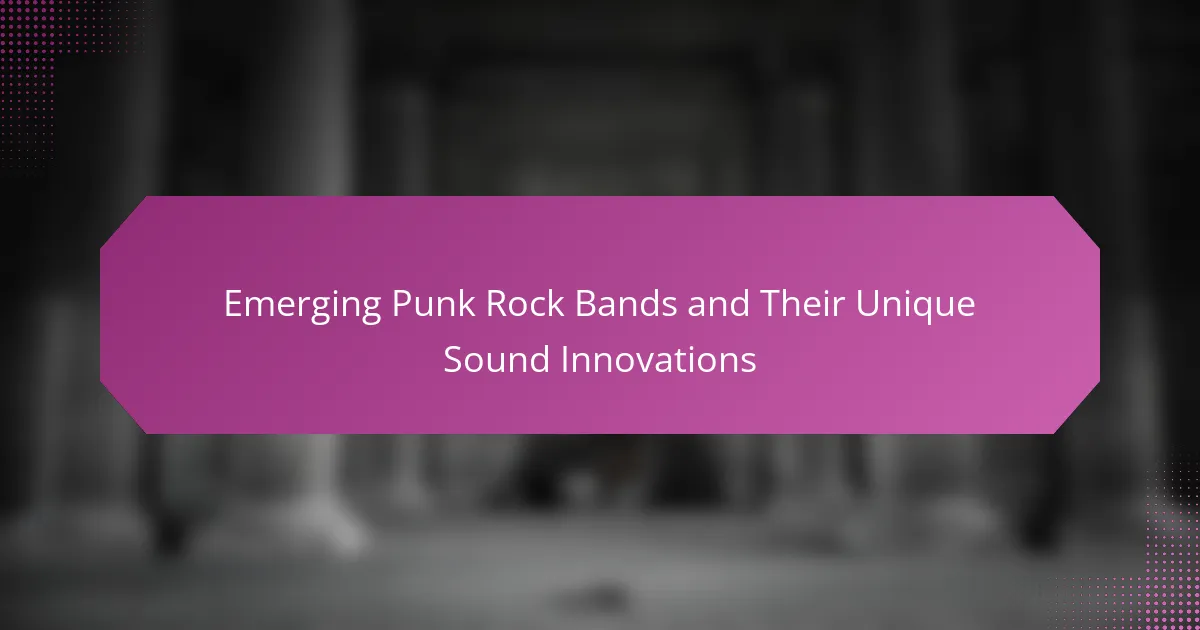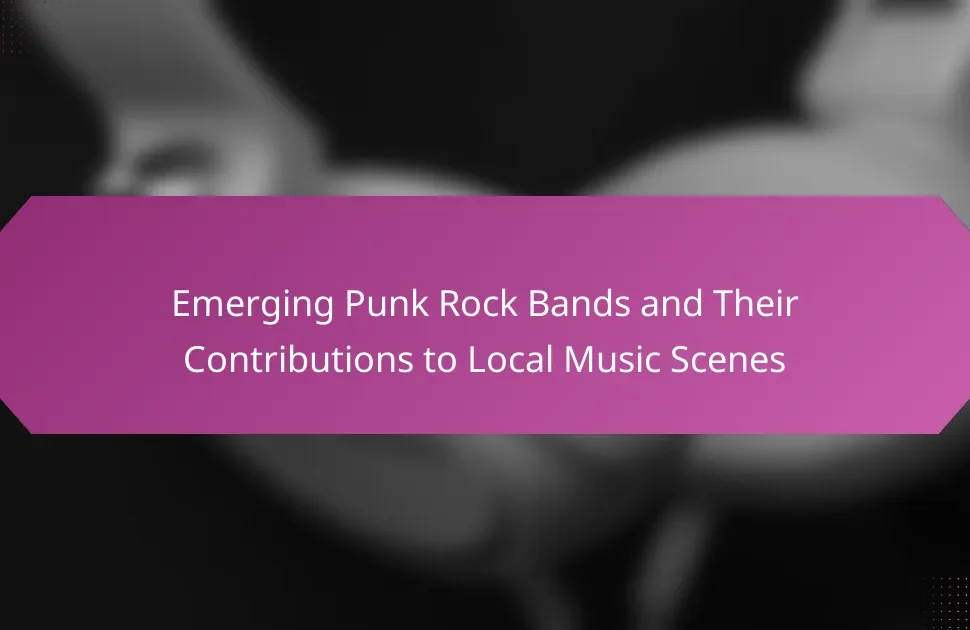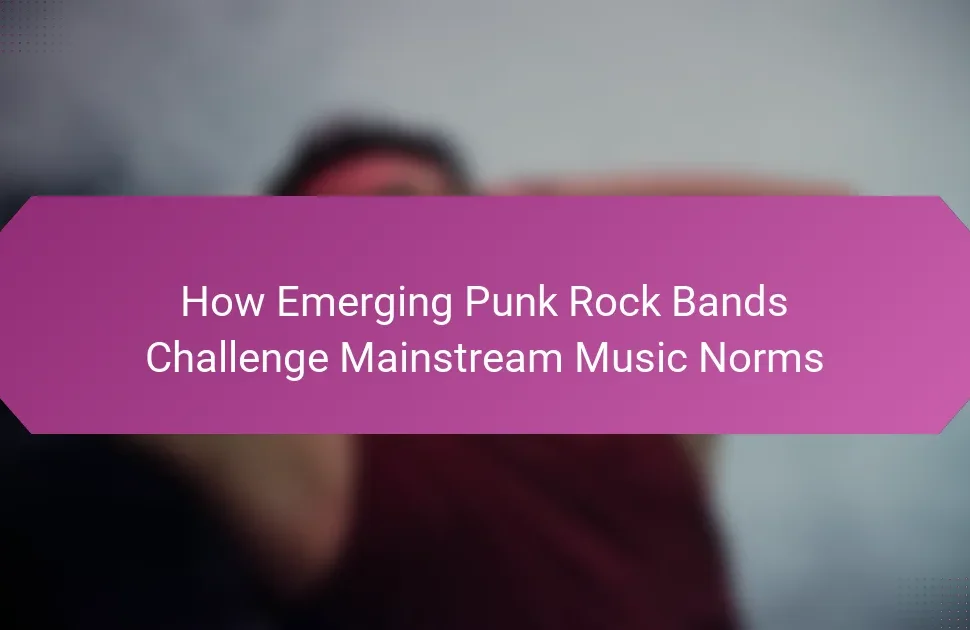Emerging punk rock bands are reshaping the music landscape with their innovative sounds and diverse influences. They blend traditional punk with electronic elements and unconventional instrumentation, creating unique auditory experiences. Cultural inspirations and social themes inform their lyrics, enhancing emotional depth. Despite facing challenges in visibility and financial stability, these bands continue to push creative boundaries and engage with new audiences.
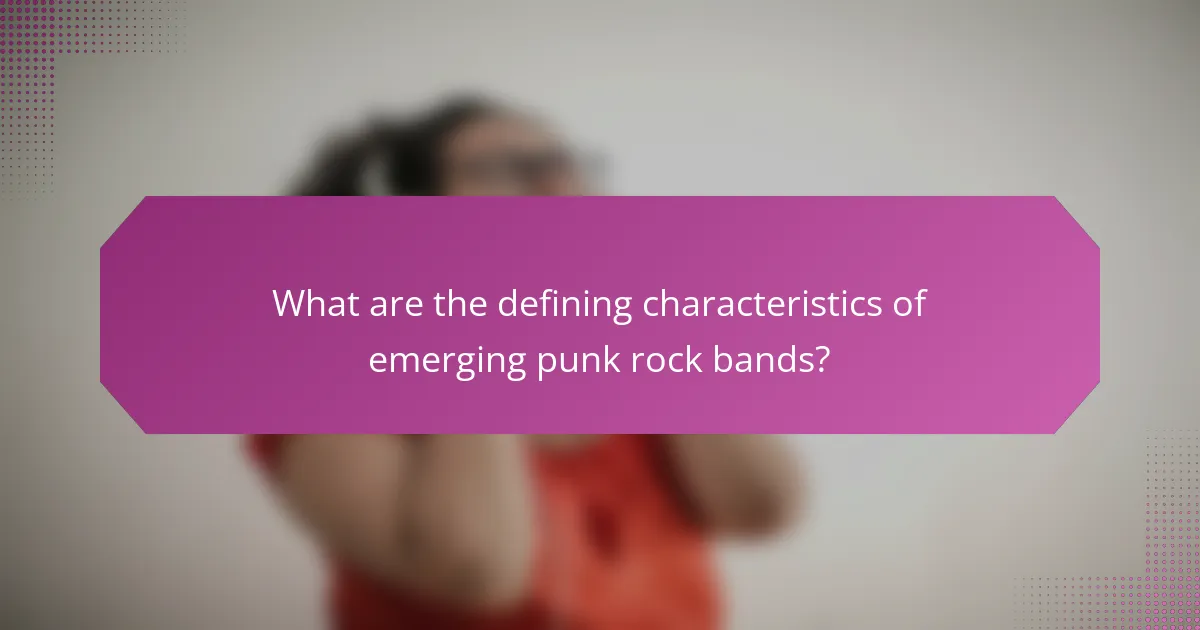
What are the defining characteristics of emerging punk rock bands?
Emerging punk rock bands are characterized by their innovative sound, blending traditional punk elements with modern influences. They often incorporate diverse genres, experiment with lyrical themes, and emphasize authenticity. Unique attributes include a focus on social issues and DIY ethics, while rare traits may involve unconventional instrumentation or multimedia integration. These bands redefine punk’s boundaries, appealing to a new generation of listeners.
How do these bands differentiate themselves from traditional punk rock?
Emerging punk rock bands differentiate themselves from traditional punk rock through innovative sound, blending genres, and unique lyrical themes. Many incorporate elements from pop, metal, and electronic music, creating a diverse auditory experience. This fusion allows for a broader appeal and reflects contemporary issues, setting them apart from the classic punk ethos. Their experimentation with production techniques further enhances their distinctiveness, pushing the boundaries of what punk can represent today.
Which themes and messages are commonly explored in their music?
Emerging punk rock bands commonly explore themes of rebellion, identity, and social commentary. Their music often conveys messages about personal freedom and resistance against societal norms. Many bands address political issues, mental health, and the struggles of youth, creating a relatable narrative for their audience. Unique sound innovations often accompany these themes, blending traditional punk elements with diverse influences to create fresh perspectives.

What innovative sound techniques are being used by new punk rock bands?
Emerging punk rock bands are utilizing innovative sound techniques like genre fusion, unconventional instrumentation, and digital production methods. These approaches create unique auditory experiences that distinguish them from traditional punk.
Many bands blend punk with electronic elements, incorporating synthesizers and samples to enhance their sound. Others experiment with atypical instruments, such as violins or brass, adding depth to their compositions. Additionally, the use of digital tools for production allows for intricate layering and sound manipulation, resulting in a modern twist on classic punk aesthetics.
This evolution in sound reflects a broader trend within the genre, where traditional boundaries are pushed, leading to a diverse range of auditory explorations. These innovations not only attract new listeners but also reinvigorate the punk rock scene.
How are technology and production methods influencing their sound?
Technology and production methods significantly shape the sound of emerging punk rock bands by enabling innovative recording techniques and diverse influences. Digital audio workstations allow for precise editing and layering, creating complex soundscapes. Additionally, access to various software plugins enables bands to experiment with unique effects, enhancing their sonic identity. The integration of social media platforms facilitates collaboration with artists across genres, further enriching their sound. As a result, these advancements lead to a distinctive blend of traditional punk elements with modern musical styles.
Which instruments and styles are frequently incorporated into their music?
Emerging punk rock bands frequently incorporate electric guitars, bass, drums, and vocals into their music. These instruments create a raw, energetic sound. Unique styles include melodic punk, hardcore punk, and pop-punk, showcasing diverse influences. Bands often experiment with unconventional rhythms and song structures, enhancing their distinctiveness.
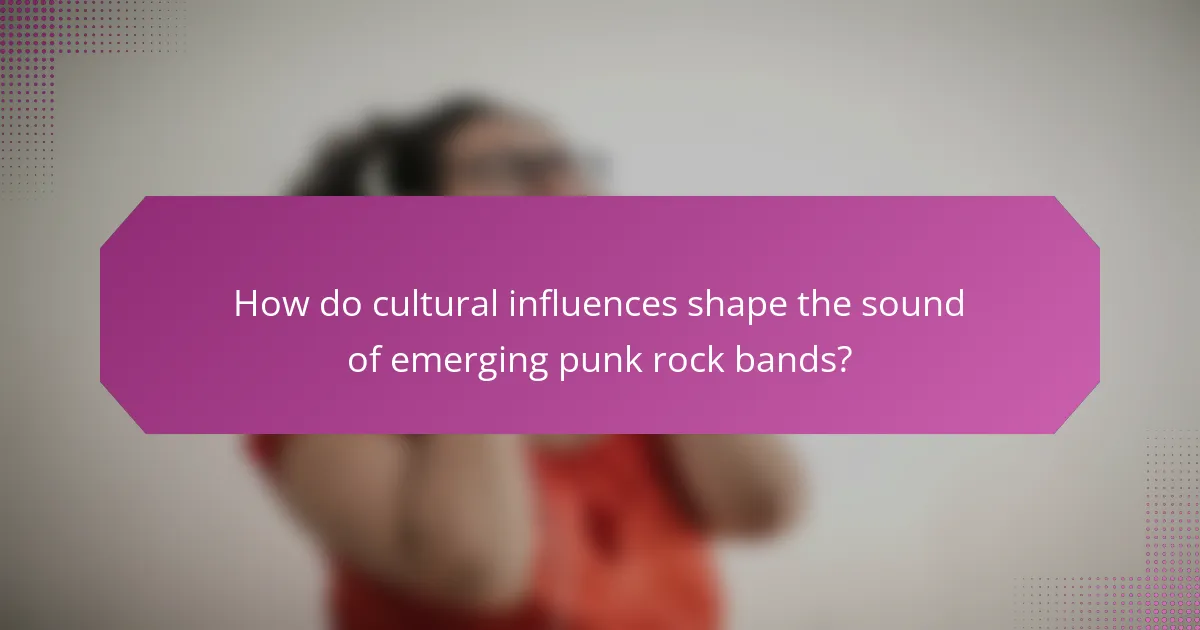
How do cultural influences shape the sound of emerging punk rock bands?
Cultural influences significantly shape the sound of emerging punk rock bands by integrating diverse musical styles and social themes. Bands often draw inspiration from local cultures, political movements, and historical contexts, creating unique sounds that reflect their environments. For instance, the fusion of traditional music elements with punk rock can result in innovative rhythms and melodies. Additionally, social issues such as identity, resistance, and community struggles frequently inform lyrical content, enhancing emotional resonance. This blend of cultural elements fosters a distinct punk identity that evolves with each new generation of artists.
What role do local scenes and communities play in their development?
Local scenes and communities are crucial for the development of emerging punk rock bands. They provide support, inspiration, and a platform for unique sound innovations.
Local venues often serve as the first stage for these bands, allowing them to connect with audiences and refine their performances. Communities foster collaboration among musicians, leading to the blending of diverse influences that shape their sound.
Furthermore, local scenes create a sense of identity and belonging, motivating bands to experiment and push creative boundaries. This environment nurtures the rare attribute of originality, enabling bands to develop distinctive styles that resonate with their local audience.
Ultimately, the interplay between local scenes and emerging punk rock bands fuels a vibrant musical culture that continuously evolves.
How does globalization impact the sound and message of these bands?
Globalization significantly influences the sound and message of emerging punk rock bands by introducing diverse cultural elements. Bands incorporate global musical styles, leading to unique sound innovations. This fusion enables them to express a broader range of social and political messages. As a result, punk rock evolves, reflecting both local and global issues, enhancing its relevance and appeal.
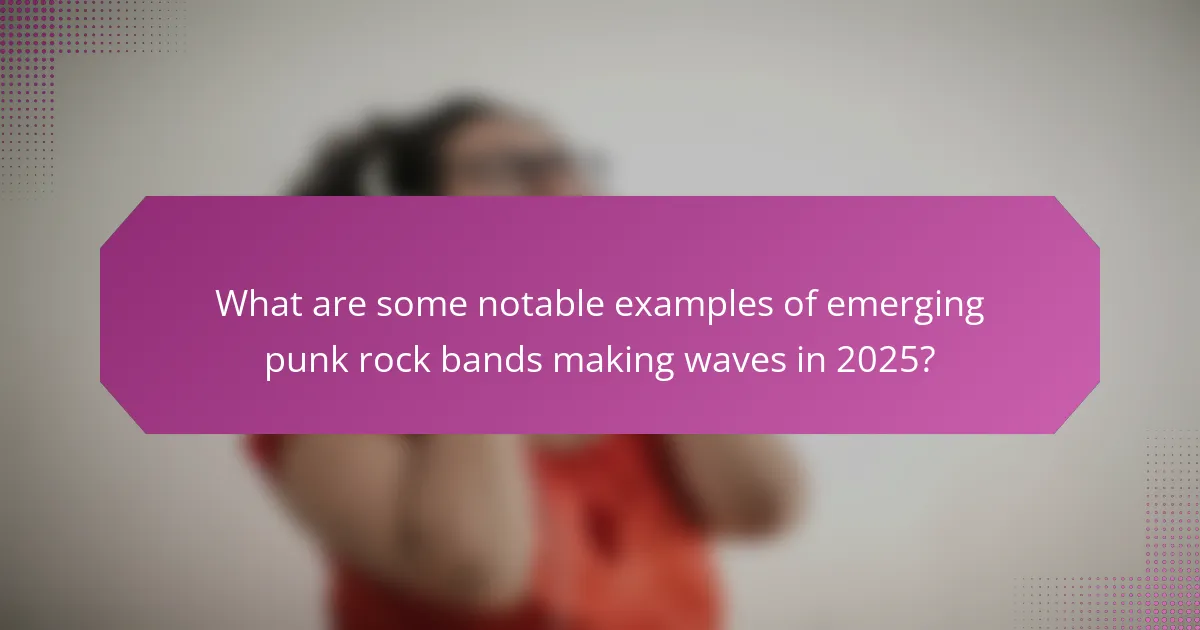
What are some notable examples of emerging punk rock bands making waves in 2025?
Emerging punk rock bands in 2025 showcase innovative sounds that blend traditional punk with diverse influences. Notable examples include bands like The Grit, known for their fusion of punk and electronic elements, and The Vibes, who incorporate reggae rhythms into their music. Another standout is Riot Theory, which experiments with unconventional song structures and lyrical themes. These bands are redefining the genre by pushing creative boundaries and appealing to a broader audience. Their unique sounds reflect the evolving landscape of punk rock.
Which bands are leading the charge in sound innovation?
Emerging punk rock bands are leading sound innovation through unique blends of genres and experimental approaches. Bands like Idles and Fontaines D.C. incorporate elements of post-punk and noise rock, creating a fresh sound. Their energetic performances and socially conscious lyrics resonate with a new generation. Additionally, bands such as Amyl and the Sniffers are redefining punk with their raw, unfiltered style that challenges norms. These innovations are pushing the boundaries of traditional punk, making it more relevant in today’s music scene.
What unique attributes set these bands apart from their peers?
Emerging punk rock bands distinguish themselves through innovative sound, lyrical depth, and genre fusion. Unique attributes include experimental instrumentation, blending of styles like pop-punk and hardcore, and a strong DIY ethic. These elements create fresh sonic landscapes that resonate with diverse audiences. Additionally, many bands prioritize social and political themes, enhancing their relevance and connection to contemporary issues.
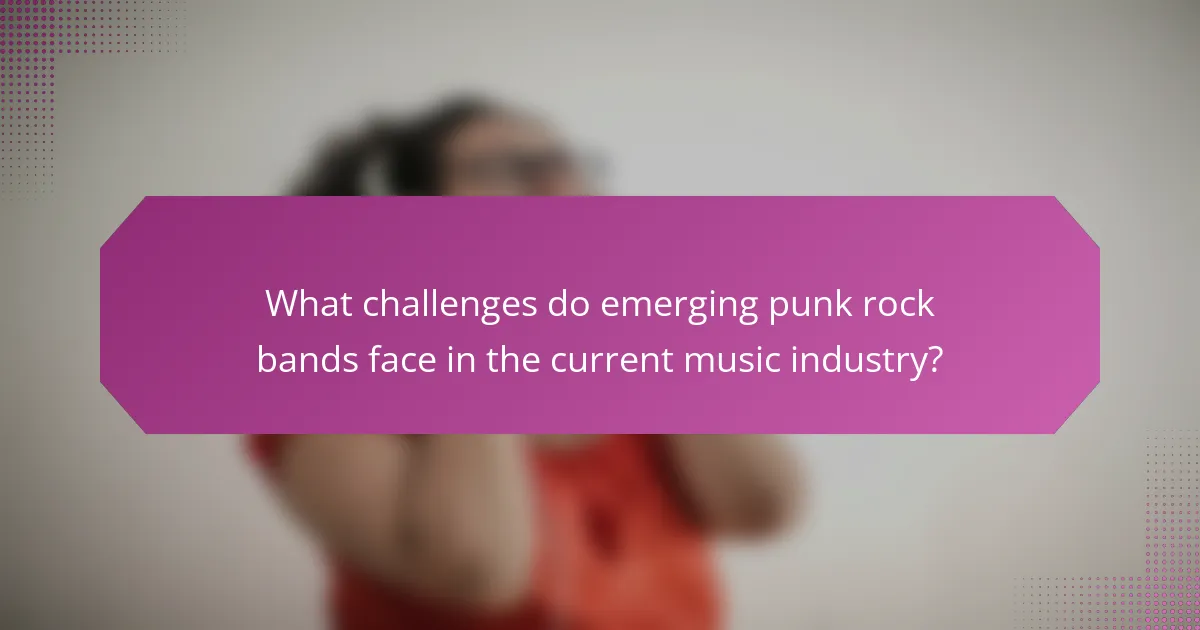
What challenges do emerging punk rock bands face in the current music industry?
Emerging punk rock bands face significant challenges in the current music industry, including limited exposure and financial instability. They struggle to gain visibility in a saturated market dominated by mainstream genres. The rise of digital streaming has altered revenue models, making it harder for these bands to monetize their music. Additionally, they encounter difficulties in securing live performances, as venues often favor established acts. The evolving nature of music consumption requires them to innovate their sound while maintaining authenticity, which can be a balancing act. Overall, these factors create a challenging environment for emerging punk rock bands to thrive.
How do they navigate issues of visibility and audience engagement?
Emerging punk rock bands navigate visibility and audience engagement through innovative sound and strategic use of social media. They often leverage platforms like Instagram and TikTok to showcase their unique styles and connect with fans directly.
Collaboration with established artists enhances their reach, while grassroots marketing efforts, such as local gigs and community events, build a loyal following. These bands often experiment with genre-blending, creating distinctive sounds that attract diverse audiences.
Utilizing data analytics helps them understand listener preferences, allowing for targeted content and engagement strategies. This approach fosters a deeper connection with their audience and enhances overall visibility in a competitive music landscape.
What strategies are effective for building a loyal fanbase?
Effective strategies for building a loyal fanbase include engaging directly with fans, showcasing unique sound innovations, and leveraging social media platforms. Emerging punk rock bands can create a strong connection by hosting live events and participating in community activities. Regularly releasing new music that reflects their unique style helps maintain interest. Collaborating with other artists can also expand their reach and attract new listeners.
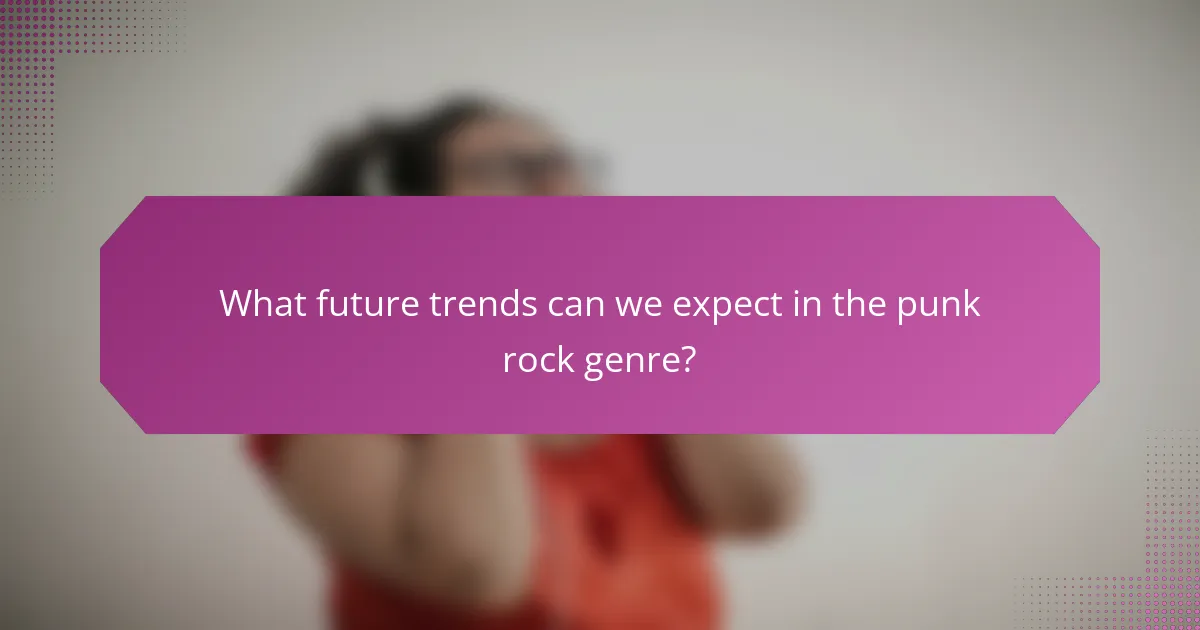
What future trends can we expect in the punk rock genre?
Emerging punk rock bands are expected to innovate with diverse influences and modern technology. Bands like Amyl and the Sniffers and IDLES are blending punk with elements of pop, hip-hop, and electronic music, creating unique soundscapes. As a result, the genre is evolving beyond traditional boundaries. Additionally, the use of social media platforms is allowing these bands to reach wider audiences and engage with fans directly, further shaping their musical direction. This trend indicates a future where punk rock remains relevant by adapting to contemporary cultural shifts.
How might the sound continue to evolve in response to societal changes?
Emerging punk rock bands will likely evolve their sound to reflect societal changes by incorporating diverse influences and addressing contemporary issues. Bands may blend genres, such as electronic or hip-hop, to resonate with younger audiences. The rise of social media allows for immediate feedback, prompting bands to adapt their music rapidly. Unique attributes, like the integration of political themes or personal narratives, will differentiate their sound. As a result, punk rock may become more inclusive and varied, appealing to a broader audience while maintaining its rebellious essence.
What innovations could redefine punk rock in the coming years?
Emerging punk rock bands are redefining the genre through innovative sounds and diverse influences. Bands are blending punk with electronic music, incorporating unconventional instruments, and exploring new lyrical themes. For example, the fusion of punk with hip-hop elements creates a fresh auditory experience. Unique attributes like genre-crossing collaborations are becoming more common. Additionally, the use of technology in music production is allowing bands to experiment with soundscapes, enhancing their creative expression. These innovations are shaping the future of punk rock, making it more inclusive and dynamic.
What best practices should emerging punk rock bands adopt for success?
Emerging punk rock bands should focus on authenticity, innovation, and community engagement for success. Authenticity builds a loyal fan base, while innovative sound sets them apart in a crowded market. Engaging with the local music scene fosters connections and opportunities.
Invest in high-quality recordings to showcase their unique sound. Utilize social media platforms to promote their music and connect with fans. Regularly perform live to gain exposure and refine their craft. Collaborate with other artists to expand their reach and influence.
Establish a strong brand identity that reflects their music and values. This can include visual elements like album artwork and merchandise. Consistent branding helps create recognition and loyalty among fans.
Finally, embrace feedback and adapt to the evolving music landscape. This flexibility can lead to sustained relevance and growth within the punk rock genre.
